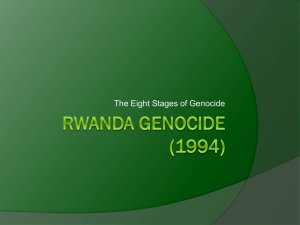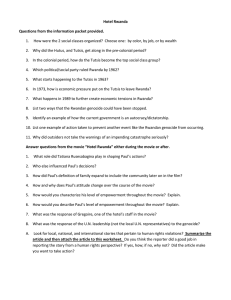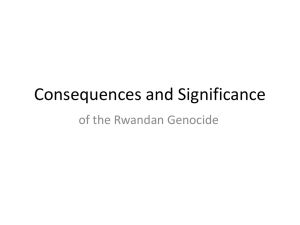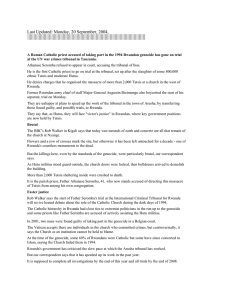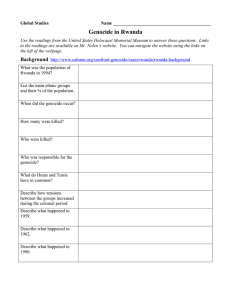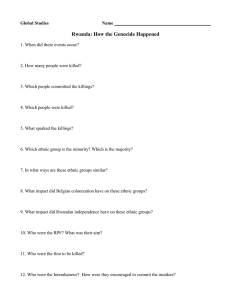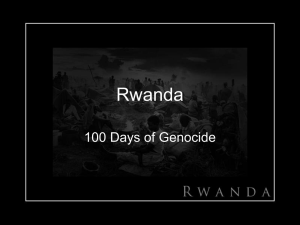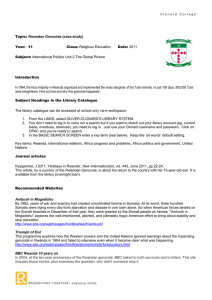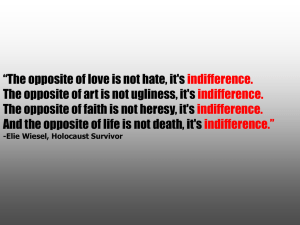Ghosts of Rwanda Introduction Lesson
advertisement
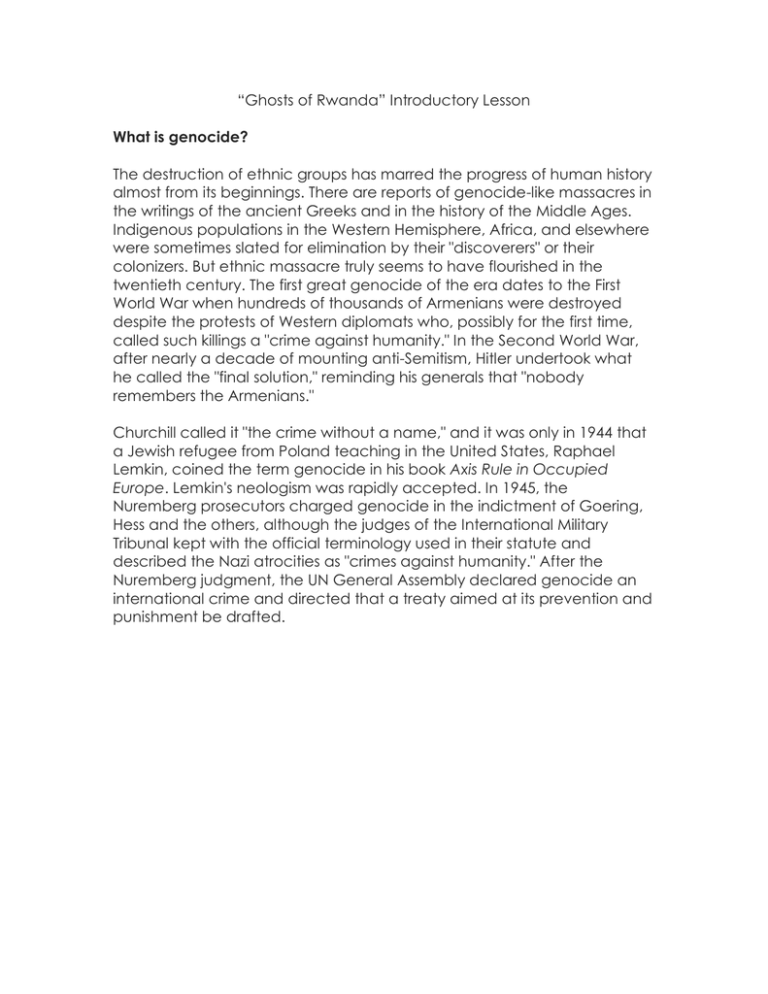
“Ghosts of Rwanda” Introductory Lesson What is genocide? The destruction of ethnic groups has marred the progress of human history almost from its beginnings. There are reports of genocide-like massacres in the writings of the ancient Greeks and in the history of the Middle Ages. Indigenous populations in the Western Hemisphere, Africa, and elsewhere were sometimes slated for elimination by their "discoverers" or their colonizers. But ethnic massacre truly seems to have flourished in the twentieth century. The first great genocide of the era dates to the First World War when hundreds of thousands of Armenians were destroyed despite the protests of Western diplomats who, possibly for the first time, called such killings a "crime against humanity." In the Second World War, after nearly a decade of mounting anti-Semitism, Hitler undertook what he called the "final solution," reminding his generals that "nobody remembers the Armenians." Churchill called it "the crime without a name," and it was only in 1944 that a Jewish refugee from Poland teaching in the United States, Raphael Lemkin, coined the term genocide in his book Axis Rule in Occupied Europe. Lemkin's neologism was rapidly accepted. In 1945, the Nuremberg prosecutors charged genocide in the indictment of Goering, Hess and the others, although the judges of the International Military Tribunal kept with the official terminology used in their statute and described the Nazi atrocities as "crimes against humanity." After the Nuremberg judgment, the UN General Assembly declared genocide an international crime and directed that a treaty aimed at its prevention and punishment be drafted. Ghosts of Rwanda Mini-Project Instructions Each group will create a PowerPoint presentation of 5-7 slides to introduce the country of Rwanda and the conflict that occurred there in 1994 between the Hutus and Tutsis. You will include a title slide with your topics in bullet form, along with your group members name and a picture. You will include at least one photo on each slide, with a caption to describe the photo. Your information should thoroughly cover the topic, as well as be relevant and succinct. This is a mini-project and should be completed in one-two days. Presentations will occur the following day. We will watch the movie Ghosts of Rwanda in class. Group 1: Your groups will find a map of Africa in 1945 and a map of Africa today. You will compare the two maps, specifically relating to Rwanda. Your group will also create a timeline to include the events that occurred on the following dates: 1899, 1919, 1935, 1959, and 1962. Group 2: Your group will create a timeline to include the events that occurred on the following dates: 1990, April 6, 1994, April 7, 1994, April 14, 1994, April 21, 1994, and April 2, 2002. Group 3: Your group will obtain information on the following key terms: Tutsis, Rwandan Patriotic Front, Interahamwe, Hutus Group 4: Your group will obtain information on the following key terms: Rwandan Armed Forces (FAR), Arusha Accords (1993), International Committee of the Red Cross, Genocide Group 5: Your group will answer the following questions to give the class key facts to know about the United Nations. When and why was the UN founded? How many members started the UN and who were they? How many members of the UN are there now and who are they? Judging from the UN website, what do you think is its most important activity today? Group 6: Your group will answer the following questions to give the class key facts to know about the Universal Declaration of Human Rights. How does the UN work in relation to human rights? When was the Universal Declaration of Human Rights declared? What does its preamble promise to do? Briefly summarize the overall concerns of the 7-8 articles of the Universal Declaration of Human Rights. Use the following websites to do your research Official website of the Republic of Rwanda - http://www.gov.rw/home/ BBC News Timeline - http://www.bbc.com/news/world-africa-14093322 History.com - http://www.history.com/topics/rwandan-genocide Samaritan’s Purse - http://www.samaritanspurse.org/ourministry/remembering-rwanda/ National Geographic http://news.nationalgeographic.com/news/2014/04/140407-rwandagenocide-today-anniversary/ PBS Timeline http://www.pbs.org/wgbh/pages/frontline/shows/evil/etc/slaughter.html United Nations - http://www.un.org/en/index.html Universal Declaration of Human Rights http://www.un.org/en/documents/udhr/ United Nations Human Rights http://www.ohchr.org/EN/Pages/WelcomePage.aspx



